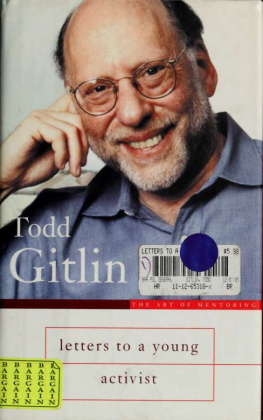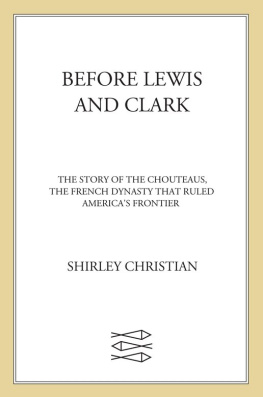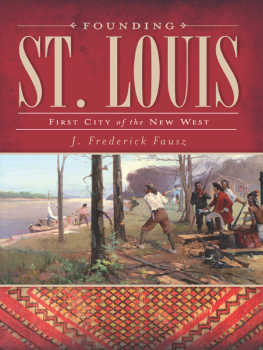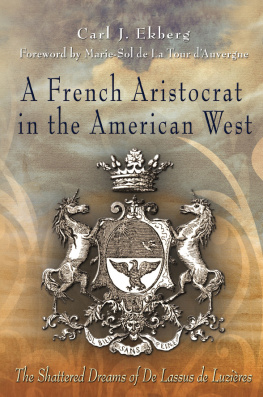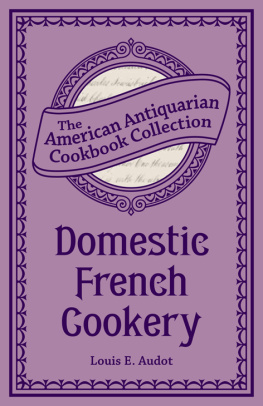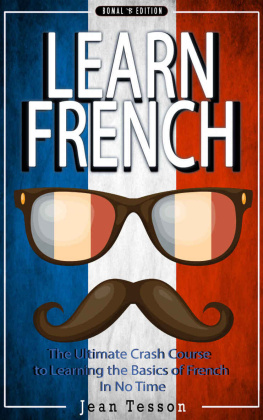THE BOURGEOIS FRONTIER
THE LAMAR SERIES IN WESTERN HISTORY
The Lamar Series in Western History includes scholarly books of general public interest that enhance the understanding of human affairs in the American West and contribute to a wider understanding of the Wests significance in the political, social, and cultural life of America. Comprising works of the highest quality, the series aims to increase the range and vitality of Western American history, focusing on frontier places and people, Indian and ethnic communities, the urban West and the environment, and the art and illustrated history of the American West.
EDITORIAL BOARD
Howard R. Lamar, Sterling Professor of History Emeritus, Past President of Yale University
William J. Cronon, University of WisconsinMadison
Philip J. Deloria, University of Michigan
John Mack Faragher, Yale University
Jay Gitlin, Yale University
George A. Miles, Beinecke Library, Yale University
Martha A. Sandweiss, Amherst College
Virginia J. Scharff, University of New Mexico
Robert M. Utley, Former Chief Historian, National Park Service
David J. Weber, Southern Methodist University
RECENT TITLES
War of a Thousand Deserts: Indian Raids and the U.S.- Mexican War, by Brian DeLay
Liberty to the Downtrodden: Thomas L. Kane, Romantic Reformer, by Matthew J. Grow
The Comanche Empire, by Pekka Hmlinen
Frontiers: A Short History of the American West, by Robert V. Hine and John Mack Faragher
Bordertown: The Odyssey of an American Place, by Benjamin Heber Johnson and Jeffrey Gusky
Emerald City: An Environmental History of Seattle, by Matthew Klingle
Making Indian Law: The Hualapai Land Case and the Birth of Ethnohistory, by Christian W. McMillen
The American Far West in the Twentieth Century, by Earl Pomeroy
Borderlines in Borderlands: James Madison and the Spanish-American Frontier, 1776-1821, by J. C. A. Stagg
The Spanish Frontier in North America, The Brief Edition, by David J. Weber
FORTHCOMING TITLES
Defying the Odds: One California Tribes Struggle for Sovereignty in Three Centuries, by Carole Goldberg and Gelya Frank
Under the Tonto Rim: Honor, Conscience, and Culture in the West, 1880-1930, by Daniel Herman
William Clarks World: Describing America in an Age of Unknowns, by Peter Kastor
Geronimo, by Robert Utley
THE BOURGEOIS FRONTIER
French Towns, French Traders, and American Expansion
Jay Gitlin

Published with the assistance of the Frederick W. Hilles Publication Fund of
Yale University, and with assistance from the Annie Burr Lewis Fund and the
income of the Frederick John Kingsbury Memorial Fund.
Copyright 2010 by Yale University.
All rights reserved.
This book may not be reproduced, in whole or in part, including
illustrations, in any form (beyond that copying permitted by
Sections 107 and 108 of the U.S. Copyright Law and except by
reviewers for the public press), without written permission from the publishers.
Maps by Adrian Kitzinger.
Set in Electra type by Tseng Information Systems, Inc., Durham, North Carolina.
Printed in the United States of America by Sheridan Books, Ann Arbor, Michigan.
Library of Congress Cataloging-in-Publication Data
Gitlin, Jay.
The bourgeois frontier : French towns, French traders,
and American expansion / Jay Gitlin.
p. cm. (Lamar series in Western history)
Includes bibliographical references and index.
ISBN 978-0-300-10118-8 (cloth: alk. paper) 1. FrenchWest (U.S.)History
2. French AmericansWest (U.S.)History. 3. West (U.S.) Ethnic relations.
4. Frontier and pioneer lifeWest (U.S.) 5. West (U.S.)History. I. Title.
F596.3.F8G585 2009
978'.01dc22 2009015230
A catalogue record for this book is available from the British Library.
This paper meets the requirements of ANSI/NISO Z39.48-1992 (Permanence of Paper).
10 9 8 7 6 5 4 3 2 1
For Ginny and Basie
And for Howard
And in memory of my wonderful parents:
Benjamin Gitlin and Libby Graff Gitlin
CONTENTS
ACKNOWLEDGMENTS
I used to marvel at the long lists of peoples names in the acknowledgments of scholarly books. Little did I realize how many people would be helping me over the course of so many years. Only two have been there from the very beginning when this book was born as an undergraduate senior essay for the history major at Yale College: my advisor Howard Lamar and my roommate Jim Babst, who introduced me to New Orleans. Over the years, Jim and his wife, Cindy, have sent books and provided a place for me to stay, even after Hurricane Katrina dislodged them from their own home. Now their children, Morgan and Beau, whom I saw first as newborns, have both graduated from Yale. I thank them all for years of friendship, great meals, and much conversation. Beau has written his own senior essay on the history of francophone Louisiana, and I hope he will someday publish his work. Dont take as long as I did, kiddo. I also thank several other classmates for their support and encouragement: Glenn Murphy, Jim Steele, and Max Addison.
We all follow our own paths. Some of us follow more than one. I could never stop playing music, and for countless years my fellow band-mates have endured my occasional scholarly ramblings during breaks on gigs. Their artistry, companionship, and support deserve a special shout out: Chris Coulter, Don Wallace, Bob DAngelo, Gaetan Veilleux, Joe Belanger, Gray Fowler, Bob Semanchik, Tod Baharian, Pete Hohmeister, Sal Ranniello, Steve Taylor, and others. Thanks for the good times and see you next weekend. Above all, Vincent Oneppo has been there throughout music school, club dates, and concerts. Our families have grown up together. He has seen me through endless computer-related melt-downs. (As one of my cousins once jokingly said as the twenty-first century arrived, Jay is now ready to enter the twentieth century.) So thanks for everything Vin. I needed the help, and youve always been there.
The world of my history day-gig has expanded greatly over the years. Im indebted to colleagues, students, and friends at Yale. Former undergraduate students Ranie Hotis, Stephen Butler, and Heath Ackley wrote wonderful essays that I acknowledge in the footnotes of this book. Current student Mara Harwel helped with research on John R. Williams of Detroit. All of my students have been a great source of inspiration and enthusiasm. In the graduate school, Bob Morrissey, Karen Marrero, and Adam Arenson have all sharpened my thinking and found material that I missed. I look forward to their own published books and am grateful for their help and friendship. It has been an honor and a pleasure to be a part of the special family of scholars gathered by Howard Lamar. Ann Fabian was the first to read a part of this manuscript. As anyone who knows her will attest, Ann is one of the most generous and perceptive of colleagues. Clyde Milner, Carol OConnor, Kathy Morrissey, and Marni Sandweiss have been wonderful and supportive friends for years. There are others, but George Miles and Bill Cronon have earned special recognition. George, consummate gentleman and conference roommate, always inspires me with his incisive comments. Bill has been a second mentor and constant friend, and his clear thinking has provided a guiding light. The late Robin Winks led me into the field of Canadian history and, as department chair, encouraged my work as a teacher and a scholar. Another department chair, Jon Butler, gave me the push I needed to finish my long-delayed dissertation and has been a strong supporter. Florence Thomas, long-time graduate registrar, has faith in all her graduate students, and her faith in me never wavered. The fellows and students of Davenport College at Yale have provided an ideal environment for years. I owe special thanks to Barbara Munck, Rhonda Vegliante, former master Gerald Thomas, and current master and classmate Richard Schottenfeld for their support. Sandy Isenstadt, co-teacher and friend, has shared ideas and enthusiasm.
Next page

